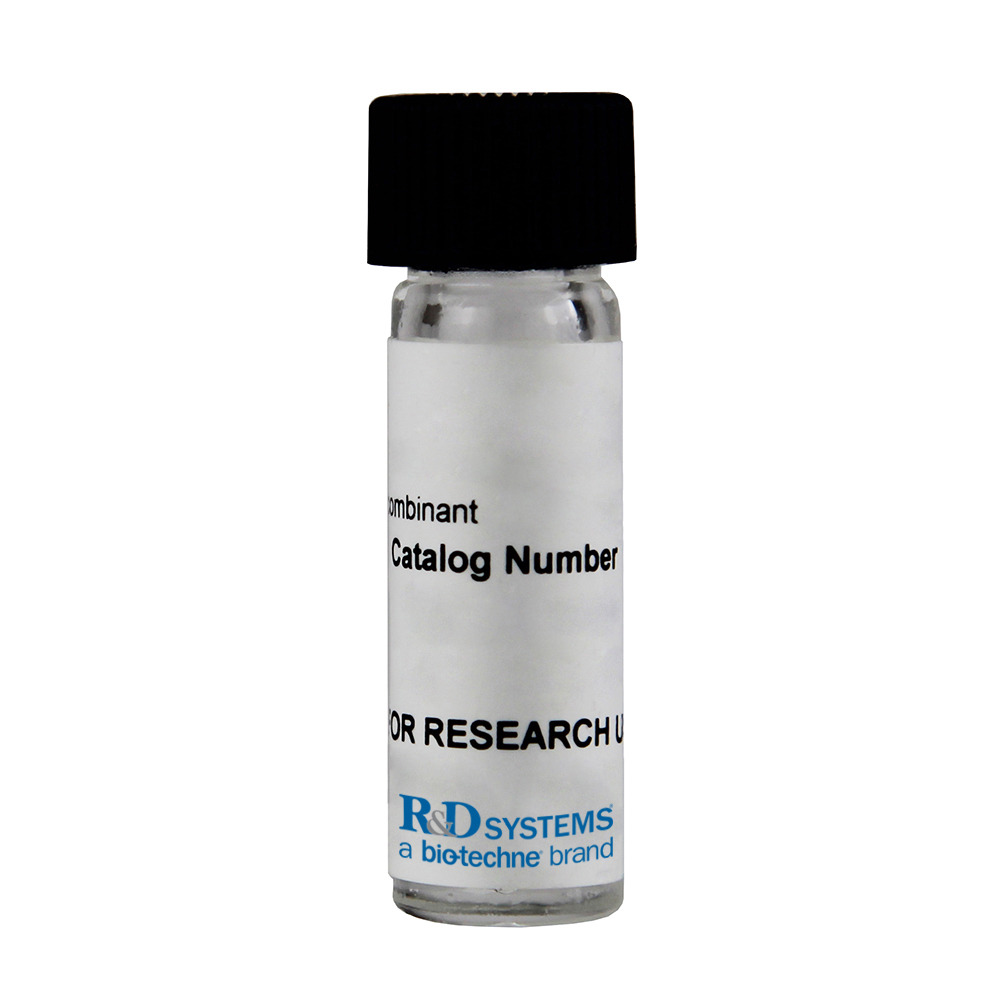 全部商品分类
全部商品分类

 下载产品说明书
下载产品说明书 下载SDS
下载SDS 用小程序,查商品更便捷
用小程序,查商品更便捷


 收藏
收藏
 对比
对比 咨询
咨询Carrier Free
CF stands for Carrier Free (CF). We typically add Bovine Serum Albumin (BSA) as a carrier protein to our recombinant proteins. Adding a carrier protein enhances protein stability, increases shelf-life, and allows the recombinant protein to be stored at a more dilute concentration. The carrier free version does not contain BSA.
In general, we advise purchasing the recombinant protein with BSA for use in cell or tissue culture, or as an ELISA standard. In contrast, the carrier free protein is recommended for applications, in which the presence of BSA could interfere.
3467-MPB
| Formulation | Lyophilized from a 0.2 μm filtered solution in MES, NaCl, CaCl2, CHAPS, ZnSO4 and PEG. |
| Reconstitution | Reconstitute at 0.25 mg/mL in 10 mM MES, 0.1 M NaCl, 100 µM CaCl2, 0.1% CHAPS, 1 µM ZnSO4 and 0.1% PEG, pH 6.0 |
| Shipping | The product is shipped with polar packs. Upon receipt, store it immediately at the temperature recommended below. |
| Stability & Storage: | Use a manual defrost freezer and avoid repeated freeze-thaw cycles.
|
Recombinant Mouse MMP-12 Protein, CF Summary
Product Specifications
Ala18-Cys462
Analysis

Background: MMP-12
Matrix metalloproteinases (MMPs) are a family of zinc and calcium dependent endopeptidases that collectively degrade the components of the extracellular matrix. MMP-12 (macrophage elastase) consists of the following domains: a pro domain, a catalytic domain containing the zinc-binding site, and a C-terminal hemopexin-like domain. The 52 kDa rmMMP-12 pro form is activated via processing into 45 kDa and 22 kDa active forms (1). MMP-12 is capable of cleaving several substrates in addition to elastin. Macrophage secretion of MMP-12 at sites of inflammation can be induced by cytokines. Given the secretion of MMP12 during an inflammatory response, MMP-12 is involved in many pathologies including vascular disease (2, 3) and cancer (4-6). In particular, MMP12-mediated pathological degradation of the extracellular matrix is a well-established key event in inflammatory-related pulmonary disease (7). For example, overexpression of MMP12 in alveolar macrophages is associated with smoking and emphysema (8) while different MMP-12 variants result in protection against chronic obstructive pulmonary disease (COPD) development (9) or cause increased risk and disease severity (10). Recently, MMP-12 has been shown to translocate into the nucleus of viral-infected cells to directly regulate transcription during an immune response (11).
- Shapiro, S.D. et al. (1993) J. Biol. Chem. 268:23824.
- Liu, S.L. et al. (2015) Sci. Rep. 5:17189.
- Iyer, R.P. et al. (2015) Int. J. Cardiol. 185:198.
- Cao, W. et al. (2017) Oncol. Rep. 3:1401.
- Klupp, F. et al. (2016) BMC Cancer 16:494.
- Chung, I.C. et al. (2014) BMC Cancer 14:348.
- Vanderbroucke, R.E. et al. (2011) Eur. Respir. J. 387:1200.
- Babusyte, A. et al. (2007) Respir. Res. 8:81.
- Hunninghake, G.M. et al. (2009) N. Engl. J. Med. 361:2599.
- Mukhopadhyay, S. et al. (2010) J. Allergy Clin. Immunol. 126:70.
- Marchant, D.J. et al. (2013) Nature Medicine 20:493.






